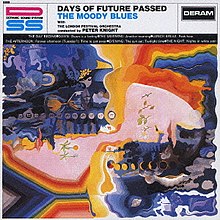Days of Future Passed
| Days of Future Passed | ||||
|---|---|---|---|---|
 |
||||
| Studio album by The Moody Blues | ||||
| Released | 10 November 1967 | |||
| Recorded | October – November 1967 | |||
| Studio | Decca Studios, London | |||
| Genre | ||||
| Length | 41:34 | |||
| Label | Deram | |||
| Producer | Tony Clarke | |||
| The Moody Blues chronology | ||||
|
||||
| Singles from Days of Future Passed | ||||
|
||||
| Professional ratings | |
|---|---|
| Review scores | |
| Source | Rating |
| AllMusic | |
| PopMatters | |
| Rolling Stone (1968) | mixed |
| Rolling Stone (2007) | favorable |
| Spin | favorable |
| Sputnikmusic | 5/5 |
| Uncut | |
| Yahoo! Music | favorable |
Days of Future Passed is the second album and first concept album by English rock band The Moody Blues, released in November 1967 by Deram Records.
With its fusion of classical and rock elements, it has been cited as one of the first examples of progressive rock.
After two years performing as a struggling white R&B band, The Moody Blues were asked by their record label in September 1967 to record an adaptation of Antonín Dvořák's Symphony No. 9 for the newly formed Deram Records division in order to demonstrate their latest recording techniques, which were named "Deramic Sound". Instead, the band (initially without the label's knowledge) decided to focus on an album based on an original stage show that they'd been working on. However, Decca recording engineer Derek Varnals disputes this story, claiming that even at the start of the sessions in 1967 there was no intent to record a Dvořák album and that talk of this project did not emerge until the mid-1970s.
Recording sessions for the album took place at Decca Studios in West Hampstead, London between 9 May and 3 November 1967. The band worked with record producer Tony Clarke, engineer Derek Varnals and conductor Peter Knight.
The album's music features psychedelic rock ballads by singer-songwriter and guitarist Justin Hayward, Mellotron played by keyboardist Mike Pinder and orchestral interludes by the London Festival Orchestra. The band and the orchestra only actually play together during the last part of "Nights In White Satin."
Music writers cite the album as an early example of progressive rock music. Bill Holdship of Yahoo! Music remarks that the band "created an entire genre here."David Fricke cites it as one of the essential albums of 1967 and finds it "closer to high-art pomp than psychedelia. But there is a sharp pop discretion to the writing and a trippy romanticism in the mirroring effect of the strings and Mike Pinder's Mellotron."Will Hermes cites the album as an essential progressive rock record and opines that its use of the Mellotron, a tape replay keyboard, made it a "signature" element of the genre. An influential work of the counterculture period,AllMusic editor Bruce Eder calls the album "one of the defining documents of the blossoming psychedelic era, and one of the most enduringly popular albums of its era."
...
Wikipedia
